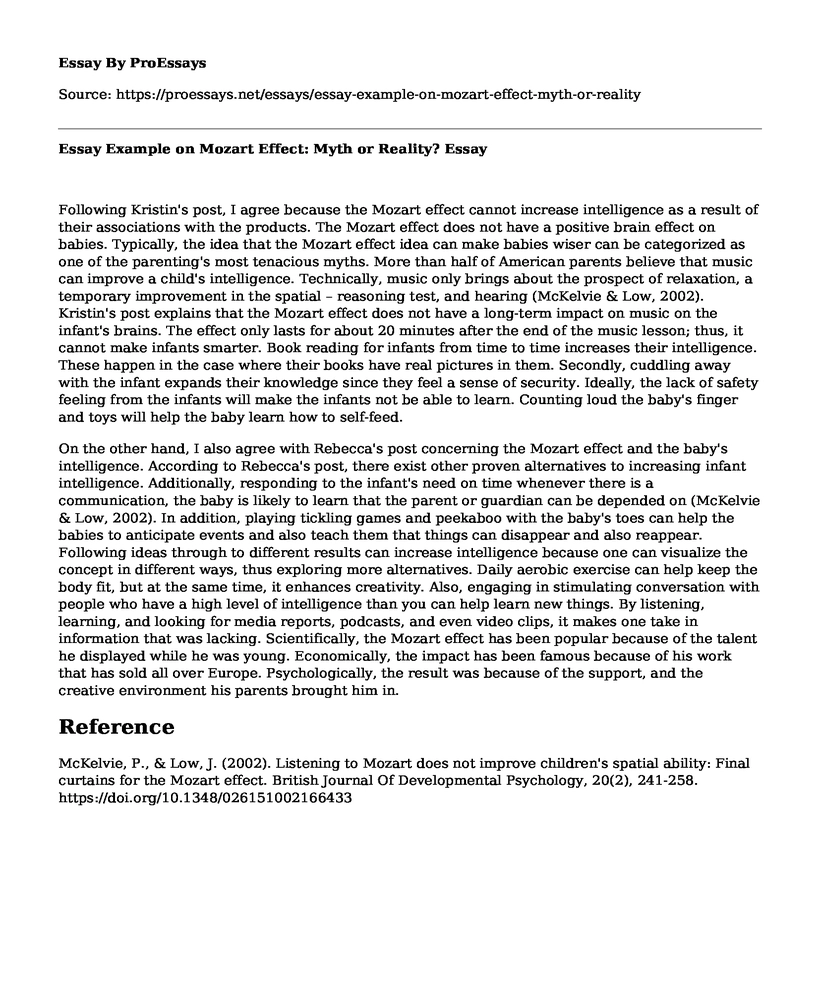Following Kristin's post, I agree because the Mozart effect cannot increase intelligence as a result of their associations with the products. The Mozart effect does not have a positive brain effect on babies. Typically, the idea that the Mozart effect idea can make babies wiser can be categorized as one of the parenting's most tenacious myths. More than half of American parents believe that music can improve a child's intelligence. Technically, music only brings about the prospect of relaxation, a temporary improvement in the spatial – reasoning test, and hearing (McKelvie & Low, 2002). Kristin's post explains that the Mozart effect does not have a long-term impact on music on the infant's brains. The effect only lasts for about 20 minutes after the end of the music lesson; thus, it cannot make infants smarter. Book reading for infants from time to time increases their intelligence. These happen in the case where their books have real pictures in them. Secondly, cuddling away with the infant expands their knowledge since they feel a sense of security. Ideally, the lack of safety feeling from the infants will make the infants not be able to learn. Counting loud the baby's finger and toys will help the baby learn how to self-feed.
On the other hand, I also agree with Rebecca's post concerning the Mozart effect and the baby's intelligence. According to Rebecca's post, there exist other proven alternatives to increasing infant intelligence. Additionally, responding to the infant's need on time whenever there is a communication, the baby is likely to learn that the parent or guardian can be depended on (McKelvie & Low, 2002). In addition, playing tickling games and peekaboo with the baby's toes can help the babies to anticipate events and also teach them that things can disappear and also reappear. Following ideas through to different results can increase intelligence because one can visualize the concept in different ways, thus exploring more alternatives. Daily aerobic exercise can help keep the body fit, but at the same time, it enhances creativity. Also, engaging in stimulating conversation with people who have a high level of intelligence than you can help learn new things. By listening, learning, and looking for media reports, podcasts, and even video clips, it makes one take in information that was lacking. Scientifically, the Mozart effect has been popular because of the talent he displayed while he was young. Economically, the impact has been famous because of his work that has sold all over Europe. Psychologically, the result was because of the support, and the creative environment his parents brought him in.
Reference
McKelvie, P., & Low, J. (2002). Listening to Mozart does not improve children's spatial ability: Final curtains for the Mozart effect. British Journal Of Developmental Psychology, 20(2), 241-258. https://doi.org/10.1348/026151002166433
Cite this page
Essay Example on Mozart Effect: Myth or Reality?. (2023, Sep 02). Retrieved from https://proessays.net/essays/essay-example-on-mozart-effect-myth-or-reality
If you are the original author of this essay and no longer wish to have it published on the ProEssays website, please click below to request its removal:
- Cambridge Analytica and Facebook Data Scandal Essay
- The Devil in a Blue Dress - Film Analysis Essay
- Persuasive Essay on Business Analysis Paper Example
- Frederick Douglass Biographical Paper Example
- Essay on Jerry's New Adventure: Climbing Against All Odds
- Essay Example on COVID-19: Online Learning Brings New Opportunities for Colleges & Universities
- Agape and Philautia: Symbiosis or Parasitism?







